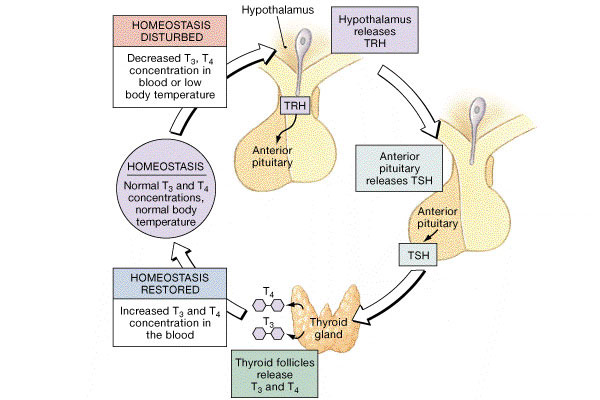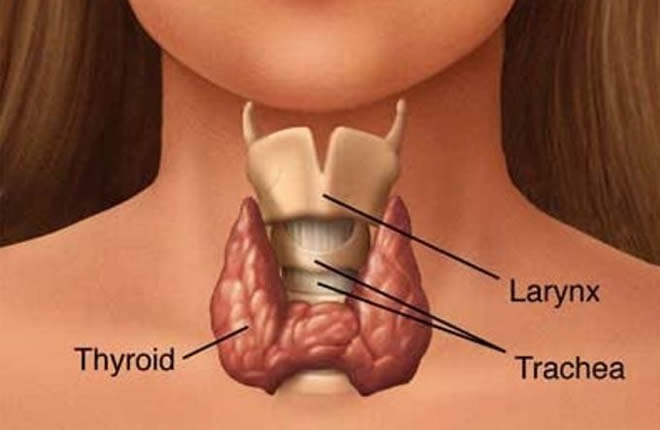What is the thyroid?
The thyroid gland is found in the neck, right below the voice box (larynx). It’s made of two large lobes that are connected in the middle. In an adult, the thyroid usually weighs about 1 ounce.
The thyroid is filled with cells that contain protein-iodine complexes. These complexes are precursors of thyroid hormones.
Thyroid hormones
Although they’re often referred to as “thyroid hormone”, singular, the thyroid gland produces two hormones: triiodothyronine (T3) and thyroxine (T4). These hormones play a vital role in regulating growth and metabolism.
The hypothalamus releases TRH (thyrotropin releasing hormone), which stimulates the release of TSH (thyroid stimulating hormone) from the pituitary gland. TSH makes its way to the thyroid and promotes its growth and development. The release of T3 and T4 is controlled by TSH.

Once T3 and T4 are released from the thyroid, they attach to proteins (mainly TBG and albumin) and move through the bloodstream.
The thyroid gland releases about 20 times more T4 than T3. But T3 is more potent than T4. Once T4 enters target tissues, it is converted to T3.
When T3 and T4 arrive at a target cell, they detach from the carrier protein and work their magic. Thyroid hormones are then degraded in target cells and the liver.
Why is the thyroid so important?
The thyroid is one of the “master controllers” that regulates nearly every major metabolic function in the body.
Thyroid hormones regulate the metabolic rate of all cells, as well as the processes of cell growth, tissue differentiation, and reproductive function. Thyroid hormones can potentially interact with any cell in the body.
Thyroid hormones are necessary for (and promote) protein anabolism when ample carbohydrates and fats are available. When the amount of thyroid hormones is excessive or when energy from food is deficient, T3 and T4 may then promote protein breakdown.
What you should know
Hormone status can influence metabolic rate, particularly in those with endocrine disorders such as hyperthyroidism and hypothyroidism. It’s also possible for one disorder to shift into another — for instance, hyperthyroid can become hypothyroid. Thyroid disorders are most often autoimmune, although they can have other causes.
Hyperthyroidism
In hyperthyroidism, or over-active thyroid function, it’s as if your body’s “motor” is revving at high speed. Symptoms can include:
- racing heart and palpitations
- trouble sleeping
- tremor and nervousness
- weight loss
- hair loss
- muscle aches and weakness
- diarrhea and over-active digestive system
- sweating and trouble tolerating heat
- exophthalmos (bulging eyes)
Hypothyroidism
Hypothyroidism refers to low thyroid function — the opposite of the above. The “motor” slows down.
If you’re struggling to lose fat even with a solid nutrition plan and regular, intense exercise, and you have some or all of the symptoms below, consider hypothyroidism as a possible contributor, especially if you’re female.
Indeed, 1 in 8 women will develop a thyroid problem at some point in life. Unexplained weight gain is one symptom of hypothyroid, but others include:
- tiredness, fatigue, lethargy
- depression and losing interest in normal activities
- forgetfulness
- dry hair and skin
- puffy face
- slow heart rate
- intolerance to cold
- constipation
- brittle nails
- muscle cramping
- changes in menstrual cycle
Women may also develop a temporary thyroid inflammation after pregnancy.

Screening for thyroid function
Some organizations recommend that any person over the age of 40 be screened periodically for thyroid function. This can be done with a blood test measuring TSH.
As previously mentioned, TSH stimulates the thyroid. If the thyroid does not respond, then TSH levels will rise. Overly high TSH levels mean that the signal is being released, but the thyroid isn’t listening. (Imagine screaming louder and louder at a person who can’t hear well.)
TSH reference ranges (may be different if on thyroid replacement): 0.4 – 4.0 mIU/L
If diagnosed, hypothyroidism is controlled with thyroid hormone replacement (specific to the individual). Many people assume that correcting the thyroid imbalance will result in a miraculous decrease of body fat – but the changes are usually subtle and take time. Nutrition, exercise and lifestyle issues all need to be addressed.
The role of iodine
As you might guess from the “iodo” in T3 and T4’s full names, we need dietary iodine to synthesize thyroid hormones. To meet the body’s demand for thyroid hormones, the thyroid gland traps iodine from the blood and uses it for the synthesis of T3 and T4.
Iodine deficiency results in a lower production of T4. The body normally contains 20 to 30 mg of iodine, with more than 75% in the thyroid gland. The RDA for iodine is 150 mcg/day for adult men and women. Diets that exclude iodized salt, fish, and seaweed have been found to contain very little iodine. Iodine from seaweed appears to enhance thyroid function.
Goitrogens and soy
A goiter is a mass of tissue in the thyroid gland. Left untreated, this can become extremely large.
Substances that contribute to this are known as “goitrogens”.
Goitrogens, which exist naturally in foods, can cause goiter by blocking the uptake of iodine from the blood by the thyroid. Goitrogens are inactivated by heating or cooking. Most goitrogens are not of clinical importance unless they are consumed in large amounts or there is coexisting iodine deficiency.
Some evidence suggests that soy acts as a goitrogen. Soy intake in controlled amounts, from unprocessed foods, doesn’t seem to negatively impact thyroid function; the effects of large amounts of processed soy are less clear. If using a synthetic thyroid medication, notify your doctor of soy food intake.
Summary and recommendations
- Consume adequate iodine
- Don’t drastically restrict calories
- Consume adequate carbohydrates and fats
- Maintain a 5 hour per week exercise regimen
- If symptoms of hypothyroidism are suspected, request a TSH test from your physician
- Get 7-9 hours of sleep each night
- Avoid synthetic chemicals found in conventional food items, body products and food containers when possible
For extra credit
Recent findings also indicate that smoking tobacco may be associated with an increased risk of goiter in iodine-deficient areas.
Hyposecretion of thyroid hormone during years of growth can lead to cretinism. This is characterized by low metabolic rate, poor growth status, and even mental retardation.
Nervous system stimulation increases thyroid hormone release and is associated with increased food intake and weight gain.
Basal metabolism, which accounts for up to 65% of daily metabolism, decreases in starvation because of reduced thyroid hormone secretion (among other things).
T3 and T4, at higher concentrations, increase the number of beta-adrenergic receptors and augment the fat and carbohydrate metabolizing actions of catecholamines.
Avoiding some chemicals found in pesticides, herbicides, eating containers (e.g., plastics), and body products (e.g., lotion, shampoo) may help to preserve thyroid function (Chemicals that contribute to thyroid dysfunction)
References
Click here to view the information sources referenced in this article.




Share